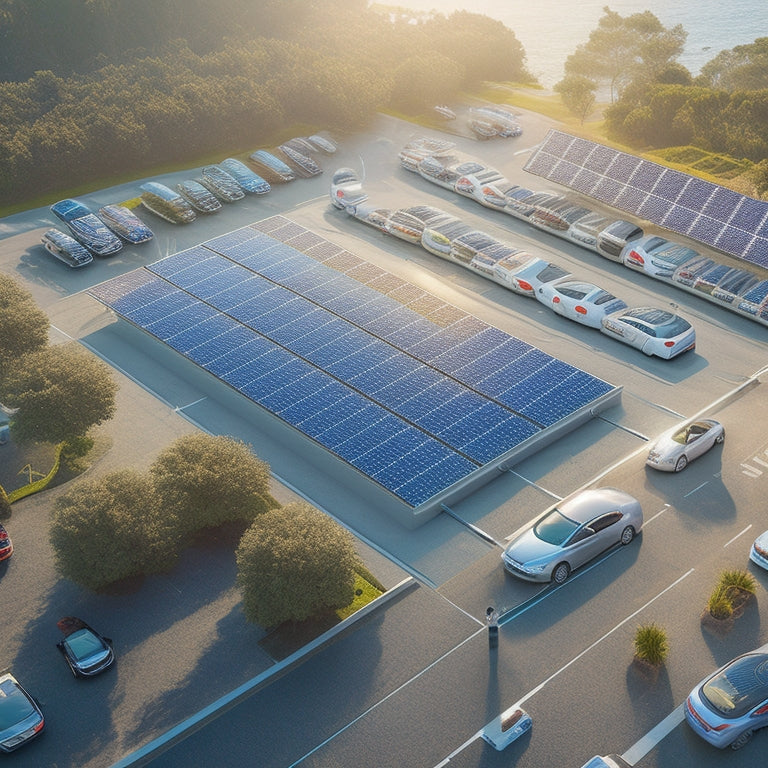
5 Best Solar Panel Solutions for Electric Fleets
Share
When electrifying your fleet, you need solar panel solutions that prioritize efficiency, durability, and scalability to guarantee a smooth switch to renewable energy. You'll want to explore cost-effective solar charging systems that reduce your carbon footprint and lower your reliance on fossil fuels. Look for high-efficiency solar panels that maximize energy output while minimizing space requirements. Customizable fleet solar solutions can be tailored to your unique energy demands, while durable solar panels can withstand harsh weather conditions. Scalable solar energy systems design ensures easy integration with your existing infrastructure. Now, discover the key features and benefits of each solution.
Key Takeaways
• Maximize energy output with high-efficiency solar panels, prioritizing panel efficiency for faster charging times and reduced space requirements.
• Seamlessly integrate solar power with existing fleet infrastructure, gaining real-time insights into energy consumption and generation.
• Ensure durability and reliability with solar panels designed to withstand harsh weather conditions, providing a consistent energy supply to reduce downtime.
• Opt for scalable solar energy systems with modular architecture, incorporating energy storage solutions and advanced monitoring and control systems.
• Achieve cost-effective electricity generation by reducing reliance on fossil fuels, creating a resilient and sustainable charging infrastructure for electric fleets.
Cost-Effective Solar Charging Systems
Your electric fleet's carbon footprint can be greatly reduced with cost-effective solar charging systems that integrate seamlessly into your existing infrastructure. By harnessing renewable energy, you can greatly lower your reliance on fossil fuels and minimize your environmental impact.
One key advantage of solar charging systems is that they can achieve grid parity, meaning the cost of generating electricity is equal to or less than traditional grid power. This makes solar energy a viable alternative for your fleet's energy needs.
To guarantee a reliable and efficient charging process, it's crucial to incorporate energy storage solutions into your solar charging system. This allows you to store excess energy generated during the day for use during periods of high demand or when the sun isn't shining.
Advanced energy storage systems can optimize your energy usage, reduce peak demand charges, and provide backup power in case of grid outages. By combining solar power with energy storage, you can create a resilient and sustainable charging infrastructure for your electric fleet.
High-Efficiency Solar Panel Options
What sets high-efficiency solar panels apart from their conventional counterparts is their ability to maximize energy output while minimizing space requirements, making them an attractive option for electric fleets with limited real estate. As you consider high-efficiency solar panels for your fleet, you'll want to prioritize panel efficiency, which can range from 18% to over 22%.
Higher efficiency means more energy generated per unit area, resulting in faster charging times and reduced land requirements.
To optimize energy output, high-efficiency solar panels often pair with advanced solar inverters. These inverters convert DC power from the panels to AC power for your electric vehicles, ensuring efficient energy transmission. Seek inverters with high conversion efficiency (above 98%) and advanced monitoring capabilities to guarantee seamless integration with your fleet's charging infrastructure.
When selecting high-efficiency solar panels, consider factors like durability, warranty, and certifications (e.g., UL, IEC). Confirm the panels meet your fleet's specific energy demands and are compatible with your existing charging infrastructure.
Customizable Fleet Solar Solutions
Fleet operators seeking tailored solar solutions can leverage customizable fleet solar solutions, which integrate seamlessly with their existing infrastructure and address specific energy demands. This approach enables you to optimize energy generation and consumption, guaranteeing a reliable and efficient fleet operation.
Customizable fleet solar solutions offer a range of benefits, including:
-
Fleet Integration: Seamlessly incorporate solar power with your existing fleet infrastructure, ensuring a smooth shift to renewable energy.
-
Energy Analytics: Gain real-time insights into your energy consumption and generation, enabling data-driven decisions to optimize your fleet's energy usage.
-
Scalability: Scale your solar solution to meet the unique energy demands of your fleet, whether it's a small or large-scale operation.
- Safety: Benefit from enhanced safety features, such as built-in monitoring and alert systems, to ensure secure and reliable energy generation.
Durable Solar Panels for Electric Fleets
When selecting solar panels for your electric fleet, prioritizing durability is crucial to guarantee a reliable and efficient energy generation system. You need solar panels that can withstand harsh weather conditions and last for a long time. Durable solar panels secure that your fleet's energy needs are consistently met, reducing downtime and increasing overall fleet optimization.
Look for solar panels with high weather resistance ratings to confirm they can withstand extreme temperatures, humidity, and weather conditions. Panels with anodized aluminum frames and tempered glass surfaces are more resistant to corrosion and damage. Additionally, consider panels with a durable backing sheet that can protect the photovoltaic cells from moisture and UV degradation.
Scalable Solar Energy Systems Design
You'll need a solar energy system that can adapt to your fleet's growing energy demands, which is why designing a scalable solar energy system is essential. As your electric fleet expands, your energy needs will increase, and a scalable system will guarantee that you can meet those needs without sacrificing efficiency or reliability.
To achieve this, consider the following key design elements:
-
Modular architecture: Design your system with modular components that can be easily added or removed as needed, ensuring that your system can scale up or down to meet changing energy demands.
-
Energy Storage: Incorporate energy storage solutions that can store excess energy generated during the day for use during periods of high demand or at night.
-
System Integration: Ensure seamless integration with your existing electrical infrastructure, including grid connection and energy management systems.
- Monitoring and control systems: Implement advanced monitoring and control systems to optimize energy production, storage, and distribution in real-time.
Frequently Asked Questions
Can Solar Panels Charge Electric Fleet Vehicles During Nighttime Hours?
You can't directly charge electric vehicles with solar panels during nighttime hours, but you can store excess energy in battery banks or energy storage systems, allowing for nighttime charging through off-grid systems.
How Do Weather Conditions Impact Solar Panel Energy Output?
'You're likely aware that weather conditions have a substantial impact on solar panel energy output. Coincidentally, cloud coverage and temperature fluctuations are the two primary factors affecting energy production, with even partial cloud coverage reducing output by up to 25%.'
Are Solar Panels Compatible With All Electric Vehicle Models?
You'll find that solar panels are compatible with most electric vehicle models, but you must consider vehicle variations, such as battery capacity, to guarantee safe and efficient charging, as some models have specific requirements.
Can Solar Panels Be Integrated With Existing Fleet Charging Infrastructure?
When integrating solar panels with your existing fleet charging infrastructure, you'll need to take into account an infrastructure upgrade, ensuring seamless energy flow and potentially incorporating energy storage solutions to guarantee a safe and efficient charging process.
Do Solar Panels Require Regular Maintenance to Optimize Energy Output?
You'll find that solar panels do require regular maintenance to optimize energy output, ensuring peak panel efficiency through strict cleaning schedules, tracking performance metrics, and balancing maintenance costs to guarantee safe and efficient operations.
Related Posts
-

Sustainable Scrubbing: Top Bathroom Solutions for Earth-Conscious Homes
You're taking an important step towards creating a more sustainable home by switching to eco-friendly bathroom cleani...
-

What Does Your Home Energy Audit Report Reveal?
Your home energy audit report reveals a detailed analysis of your energy consumption patterns, highlighting areas of ...
-

5 Ways Geothermal Power Boosts Electric Vehicle Efficiency
You're likely unaware that geothermal power can greatly enhance your electric vehicle's (EV's) performance, range, an...


